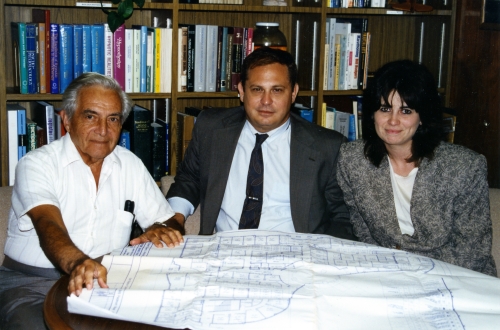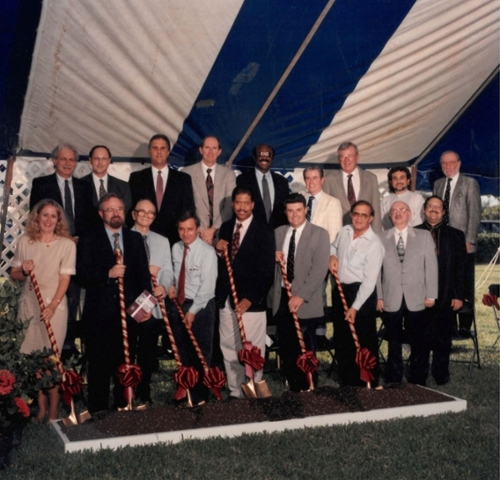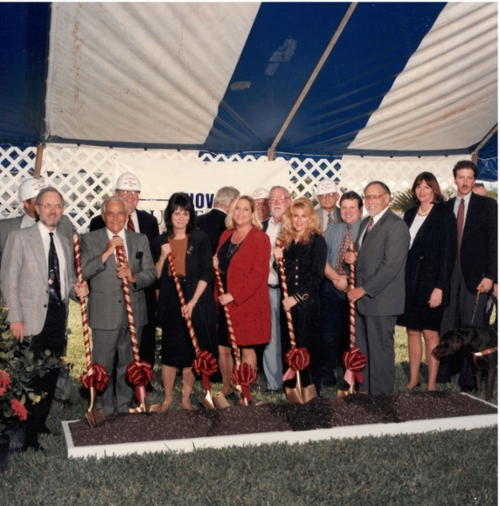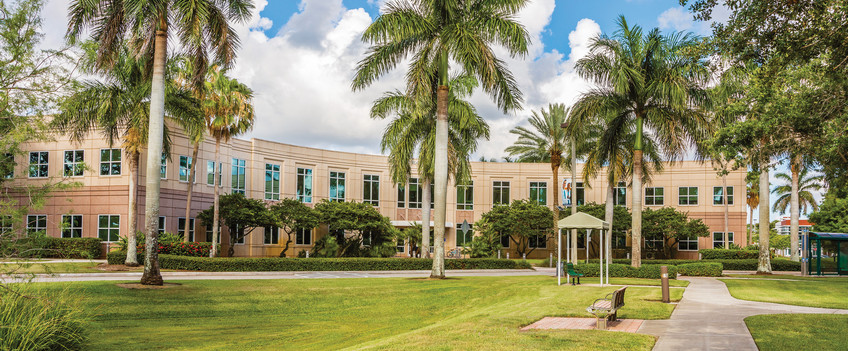NSU’s College of Psychology, originally established in 1967 as part of the Behavioral Sciences Center, has achieved national distinction for its mission, faculty, programs, and services that integrate the science and practice of psychology and counseling through rigorous research, hands-on training, and the provision of services to the community.
The College of Psychology, in various names and forms, has had a long history at Nova Southeastern University. Originally part of the Behavioral Sciences Center, its current structure is comprised of elements of two prior units: the Center for Psychological Studies (CPS) and the Farquhar College of Arts and Sciences (FCAS).
In 1986, the Behavioral Science Center was reorganized into the graduate-focused CPS under Founding Dean Frank DePiano, Ph.D. The college, like many other early units at Nova University, shared the same limited space in the Mailman-Hollywood Building, one of the original three buildings on the Fort Lauderdale-Davie Campus. On the undergraduate side, the B.S. in Psychology was introduced in 1987.
 DePiano established a connection with Anne Maltz, the widow of Dr. Maxwell Maltz (1889-1975), a noted plastic surgeon and author of the bestselling 1960 book Psycho-Cybernetics. Focusing on positive thinking and working to improve self-image, the book is now considered a classic in the self-help area. Dr. Maltz was also a lecturer at Nova University prior to his death in 1975. Seeking funding for a new home for the college, DePiano suggested that Anne Maltz donate the funds to construct a building that would bear her late husband’s name. At the same time, DePiano connected Anne Maltz with Anne Hutt, the widow of psychologist and businessman Max L. Hutt. The two widows struck up a friendship due to the shared connection of similar names, and both pledged to donate to the university.
DePiano established a connection with Anne Maltz, the widow of Dr. Maxwell Maltz (1889-1975), a noted plastic surgeon and author of the bestselling 1960 book Psycho-Cybernetics. Focusing on positive thinking and working to improve self-image, the book is now considered a classic in the self-help area. Dr. Maltz was also a lecturer at Nova University prior to his death in 1975. Seeking funding for a new home for the college, DePiano suggested that Anne Maltz donate the funds to construct a building that would bear her late husband’s name. At the same time, DePiano connected Anne Maltz with Anne Hutt, the widow of psychologist and businessman Max L. Hutt. The two widows struck up a friendship due to the shared connection of similar names, and both pledged to donate to the university.
Opened in 1996 as the Maltz Psychology Building, the 68,000-square-foot facility houses classrooms, faculty and administration offices, and the Psychology Services Center (PSC). The 15 clinics that fall under the umbrella of the PSC offer a variety of mental health services to the South Florida community. The building's first floor also features a wing named in honor of Anna Maltz and Anne Hutt.
In its numerous forms, the college has introduced several innovative and career-focused graduate and undergraduate programs. In 2011, FCAS rolled out the M.S. in Experimental Psychology, while CPS introduced the M.S. in General Psychology. In 2012, CPS established the M.S. in Forensic Psychology, and FCAS began offering courses with the neuroscience (NEUR) prefix. Two years later, the neuroscience offerings grew into a full major as the B.S. in Neuroscience. Until 2015, all of FCAS' psychology programs were housed within the Division of Social and Behavioral Sciences (SBS).
In 2015, NSU underwent a university-wide reorganization that combined some schools, centers, and colleges into new units. The reorganization transformed elements of FCAS and CPS into the new College of Psychology. The reorganization brought faculty from both units together during the transition year of 2015-16.
FCAS' psychology programs, plus General Psychology and Forensic Psychology, formed the new Department of Psychology and Neuroscience. The new college's other divisions include the Department of Counseling, housing the M.S. in Counseling, and the Department of Clinical and School Psychology, housing graduate and specialist programs.
In addition to the Maxwell Maltz Building, the college has neuroscience labs and faculty offices in the Parker Building, plus a lab at the state-of-the-art Center for Collaborative Research.
College of Psychology Program Timeline
|
Name of Program
|
Effective Term/Year
|
Initial Date of Program Accreditation/Approval
|
|
Clinical Psychology (Ph.D.)
|
1972
|
1981
|
|
Clinical Psychology (Psy.D.)
|
1981
|
1983
|
|
Counseling Psychology*
|
1974
|
|
|
Mental Health Counseling*
|
|
|
|
School Counseling*
|
|
|
|
Counseling (M.S.)
|
2002
|
2021
|
|
Experimental Psychology (M.S.)
|
2011 (Fall)
|
NA
|
|
Forensic Psychology (M.S.)
|
2012 (Aug)
|
NA
|
|
General Psychology (M.S.)
|
2011 (Winter)
|
NA
|
|
Neuroscience (B.S.)
|
2013 (Fall)
|
NA
|
|
Psychology (B.S.)
|
1987 (Fall)
|
NA
|
|
School Psychology (Psy.D.)
|
2011 (Fall)
|
2015
|
|
School Psychology (Psy.S.)
|
2001
|
2005 (FLDOE)
2013 (NASP)
|
*Program became Counseling (MS)
Key Historical Events
|
Date
|
Event
|
|
1961
|
- The South Florida Education Center (SFEC) was organized to create an educational complex of institutions ranging from pre-elementary to postdoctoral education to invent, implement, evaluate, and disseminate innovative practices in all areas.
|
|
1964
|
- Nova University opened offices on Las Olas Boulevard in Fort Lauderdale, Florida. Warren J. Winstead, Ph.D., was named president.
- Nova University was chartered by the state of Florida as Nova University of Advanced Technology.
|
|
1965
|
- Nova University received several gifts that enabled the construction of the Louis Parker Physical Sciences Building and the Rosenthal Student Center and established an endowed chair in physics.
|
|
1967
|
- The Behavioral Sciences Center was founded. The Center is the precursor of the College of Psychology.
- The Edwin M. and Esther L. Rosenthal Student Center was dedicated at the Fort Lauderdale/Davie Campus.
- Classes at Nova University formally began; the student body consisted of 17 Ph.D. students in behavioral science, physics and physical chemistry, and oceanography. There were 17 faculty members and 38 staff members.
|
|
1968
|
- The Louis Parker Physical Sciences Center, the Davie Living Complex, and the Fort Lauderdale/Davie Campus were officially opened.
|
|
1970
|
- The first five Nova University graduates received their Ph.D. degrees.
- A federation with New York Institute of Technology (NYIT) was established. Alexander Schure, then president of NYIT, was named chancellor of Nova University.
- Abraham S. Fischler, Ed.D. was named president of Nova University.
|
|
1971
|
- Nova University received full accreditation for five years from the Southern Association of Colleges and Schools (SACS).
|
|
1974
|
- The board of trustees voted to change the university’s name to Nova University, Inc.
|
|
1975
|
- Nova University received full accreditation for a 10-year period from SACS.
|
|
1976
|
- Nova College was established at the Fort Lauderdale/Davie Campus.
|
|
1980
|
- Nova College received accreditation from SACS in December.
|
|
1981
|
- The Florida School of Professional Psychology merged into Nova University, and the Psy.D. degree in clinical psychology was offered.
- The Ph.D. Program in Clinical Psychology received full accreditation from the American Psychological Association.
- The Nova University Mailman-Family Center building was dedicated.
|
|
1983
|
- The Psy.D. Program in Clinical Psychology received accreditation from the American Psychological Association.
|
|
1985
|
- Nova University’s SACS accreditation was reaffirmed for a 10-year period.
- The university revolutionized distance education with the development and implementation of the electronic classroom for delivery of online courses.
- The federation between NYIT and Nova University was dissolved by mutual agreement.
- Abraham S. Fischler, Ed.D., president, became chief executive officer of the university.
|
|
1986
|
- The Behavioral Science Center became the Center for Psychological Studies.
|
|
1988
|
- The Nova University Community Mental Health Center predoctoral internship received full accreditation by the APA.
|
|
1989
|
- Nova University celebrated its 25th anniversary.
|
|
1992
|
- Stephen Feldman was selected as the third president of Nova University.
- Nova University’s first building, the Rosenthal Student Center, was expanded to include a dining hall, full kitchen, bookstore, and administrative offices.
|
|
1994
|
- Southeastern University of the Health Sciences merged with Nova University to form Nova Southeastern University (NSU).
- Ovid C. Lewis was selected as the fourth president of NSU.
- The William and Norma Horvitz Administration Building was dedicated.
|
|
1995
|
- Based on its fall 1995 enrollment, NSU became the largest independent university in the state of Florida.
|
|
1996
|
- The Maxwell Maltz building, housing the Center for Psychological Studies and its Community Mental Health Center, was dedicated.
|
|
1998
|
- The board of trustees named Ray Ferrero, Jr., as the university’s fifth president.
- George Hanbury, Ph.D., was appointed executive vice president and chief operating officer by Ray Ferrero, Jr., J.D., NSU president.
- NSU’s regional accreditation was reaffirmed by the Commission on Colleges of the Southern Association of Schools for another 10 years.
- The board of trustees approved construction of the 325,000-square-foot Library, Research, and Information Technology Center on the Fort Lauderdale/Davie Campus.
|
|
1999
|
- Nova Southeastern University celebrated its 35th anniversary.
|
|
2000
|
- President Ferrero received the American Psychological Association’s Presidential Citation Award for his efforts to expand and improve mental health services in South Florida.
- The American Psychological Association reaffirmed the Center for Psychological Studies doctoral program accreditation for another seven years.
|
|
2001
|
- The 325,000-square-foot Library, Research, and Information Technology Center was dedicated. It is a joint-use facility that resulted from an innovative agreement between NSU and the Broward County Board of County Commissioners. The new facility is one of the largest library buildings in Florida.
- Ground was broken for the Jim & Jan Moran Family Center Village and a $6 million challenge grant to the center was announced by JM Family Enterprises, Inc.
|
|
2003
|
- The new 110,000-square-foot Jim & Jan Moran Family Center Village housing the Mailman Segal Institute for Early Childhood Studies was dedicated.
|
|
2010
|
- Ray Ferrero, Jr., who was then president, became university chancellor and CEO, and George Hanbury, who was then executive vice president and COO, became university president and COO.
- The Division of Applied Interdisciplinary Studies was created. This new division encompasses the Center for Psychological Studies, the Graduate School of Humanities and Social Sciences, the Mailman Segal Institute for Early Childhood Studies, and the Criminal Justice Institute.
|
|
2011
|
- George L. Hanbury II, Ph.D., took office as the sixth president and CEO of Nova Southeastern University. He began the creative process for implementing NSU’s Vision 2020.
- NSU was elevated from Doctoral Research University to Research University—High Research Activity, reflecting two of NSU’s core values: scholarship and research. At the time, NSU was 1 of only 37 universities in the nation with both the Carnegie classification of high research activity and community engagement.
|
|
2012
|
- The National Council for Accreditation of Teacher Education (NCATE) granted accreditation without qualifications to all degree programs in NSU’s Abraham S. Fischler School of Education and to education related programs within the university’s Center for Psychological Studies.
|
|
2015
|
- In 2015, NSU restructured its colleges, schools, and centers (renaming several) with the goal of maximizing and leveraging graduate and professional degree programs to attract the best and brightest undergraduate students.
- The Center for Psychological Studies became the College of Psychology. The new College now offered both undergraduate and graduate programs.
- NSU tied for 10th in U.S. News & World Report’s Campus Ethnic Diversity rankings for the 2014–15 school year. NSU is the largest private, not-for-profit institution in the United States that meets the U.S. Department of Education’s criteria as a Hispanic-serving Institution.
- The university awards more doctoral and professional degrees to Hispanics and other minorities than any other university in the United States.
|
|
2016
|
- NSU was designated a Military Friendly School by Victory Media, publisher of G.I. Jobs, STEM Jobs, and Military Spouse.
|
|
2020
|
- The Mailman Segal Center for Human Development was reorganized and integrated into the NSU University School, the Abraham S. Fischler College of Education and School of Criminal Justice, the College of Psychology, and the Dr. Pallavi Patel College of Health Care Sciences.
- Partnering with Broward County, NSU announced the creation of the Alan B. Levan | NSU Broward Center of Innovation, to open in 2021. Occupying 54,000 square feet of space on the fifth floor of NSU’s Alvin Sherman Library, the center will bring together NSU students and faculty members, entrepreneurs, and investors and will serve as an economic development engine for South Florida.
|
|
2021
|
- The Council for Accreditation of Counseling and Related Educational Programs (CACREP) granted an 8-year accreditation to the M.S. in Counseling, Clinical Mental Health Counseling (CMHC) concentration.
|
|
2022
|
- MS Counseling: School Counseling concentration program delivery was changed from a face to face to an online format.
|
Key historical highlights courtesy of the NSU Factbook.
Maxwell Maltz Building Groundbreaking Pictures

Dr. Gene Shapiro, founding Dean Dr. Frank DePiano, and colleague with Maltz building map.

(Top Row L-R) Barry Schneider, Rob Kabacoff, William Dorfman, William Kelleher, Unknown, Doyle Montgomery, William (Joe) Burns, Steve Gold, Bernie Eingold.
(Bottom Row L-R) Jan Faust, Mark Sobell, Leo Reyna, Edward Simco, Timothy Moragne, John E. Lewis, Nathan Azrin, Robert Lane, Charles Golden.

Faculty and staff at the Maxwell Maltz Building groundbreaking. (Gene Shapiro, Nancy Varner (HR), Kimberly Durham, Karen Grosby, and Alan Katell are in the first row).

 DePiano established a connection with Anne Maltz, the widow of Dr. Maxwell Maltz (1889-1975), a noted plastic surgeon and author of the bestselling 1960 book Psycho-Cybernetics. Focusing on positive thinking and working to improve self-image, the book is now considered a classic in the self-help area. Dr. Maltz was also a lecturer at Nova University prior to his death in 1975. Seeking funding for a new home for the college, DePiano suggested that Anne Maltz donate the funds to construct a building that would bear her late husband’s name. At the same time, DePiano connected Anne Maltz with Anne Hutt, the widow of psychologist and businessman Max L. Hutt. The two widows struck up a friendship due to the shared connection of similar names, and both pledged to donate to the university.
DePiano established a connection with Anne Maltz, the widow of Dr. Maxwell Maltz (1889-1975), a noted plastic surgeon and author of the bestselling 1960 book Psycho-Cybernetics. Focusing on positive thinking and working to improve self-image, the book is now considered a classic in the self-help area. Dr. Maltz was also a lecturer at Nova University prior to his death in 1975. Seeking funding for a new home for the college, DePiano suggested that Anne Maltz donate the funds to construct a building that would bear her late husband’s name. At the same time, DePiano connected Anne Maltz with Anne Hutt, the widow of psychologist and businessman Max L. Hutt. The two widows struck up a friendship due to the shared connection of similar names, and both pledged to donate to the university.

